Iran-Backed Islamic Resistance In Iraq Strikes US Base In Syria
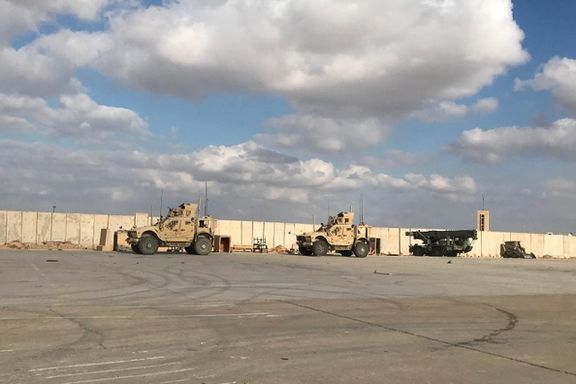
The IRGC-backed Islamic Resistance in Iraq, declared that it used unmanned aerial vehicles to target an American base in Syria.

The IRGC-backed Islamic Resistance in Iraq, declared that it used unmanned aerial vehicles to target an American base in Syria.
The militant group stated that its fighters employed drones to target the base in Al-Khazra village in Syrian territory, taking the attacks on US targets in the region to over 100 since the Gaza war began on October 7.
Iranian proxies have said that the US backing of Israel in its retaliation of the Hamas invasion of October 7, killing 1,200 mostly civilians and taking over 240 hostage, led to the US attacks in the region.
Earlier reports on Saturday night had indicated that the Islamic Resistance in Iraq targeted a US base in the Hasakah province of Syria with rockets. Extremist militant groups supported by Iran, have launched attacks against US and Israeli targets in the region including Lebanese Hezbollah on Israel's southern border and attacks on Red Sea vessels by the Houthis in Yemen.
US Secretary of State Antony Blinken urged Iraq to fulfill its commitments to protect all bases hosting US troops earlier this month as Iraq and Syria come under continued attack. As a result of the Houthi attacks on vessels in the Red Sea, pledging to target US and Israeli interests, a multi-nation coalition has been led by the US to counter such threats, with at least 20 nations participating. Despite the initiative, the Biden administration faces increasing criticism for its perceived failure to deter Iran and its proxies in the Middle East.
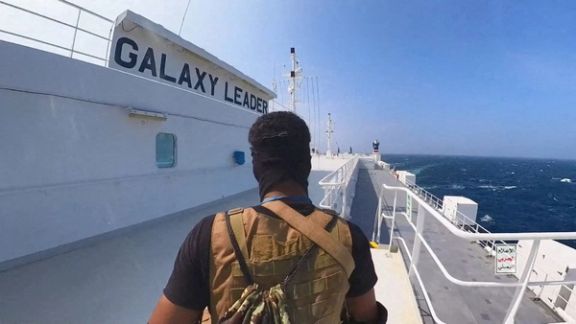
Yemen's Iran-backed Houthis have raised threats against all shipping in areas within their reach while stepping up recruitment, according to reports in The Times.
Thousands in the war-torn country have been hired since October 7, as the Yemeni militia steps up both naval and aerial attacks against Israel, the US and their allies.
Just last month, the Houthis' leader said 10,000 more troops had been recruited amid the dire poverty in the Middle East's poorest nation, and thousands more, including child soldiers, are now among those taken in the second round of training in the proxy war being waged against Israel, The Times reports.
Yemen is notorious for its taking on child soldiers, and the latest war, which is being waged in support of Gaza's Hamas militia, is the latest campaign which has seen the Houthis come back to the fore.
Houthis’ Information Minister Dhaif Allah (Dhaifullah) Al-Shami told Qatari newspaper Al-Araby Al-Jadeed Monday that any country that joins the US-led international maritime coalition - now comprising at least 20 nations - to protect Red Sea trade will become a target from the Yemeni rebels.
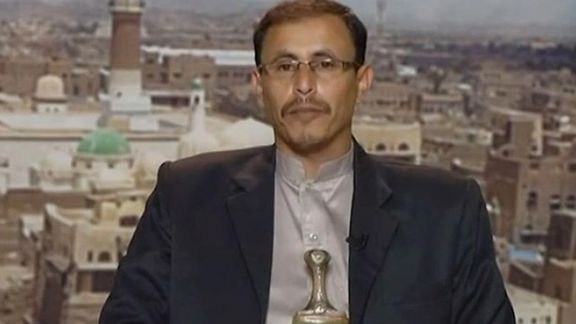
Hours after Washington launched the multinational force, Houthis threatened to ‘sink’ US warships. The new maritime coalition includes Britain, Canada, France, Italy, Spain, Norway, Netherlands, Seychelles and Bahrain. It was formed in response to Houthi attacks on commercial vessels passing through the Bab el-Mandeb Strait and the Red Sea, transiting between Asia and Europe through the Suez Canal. Saudi Arabia, Egypt and the United Arab Emirates have chosen not to join the multinational naval alliance.
“Any alliance of this kind is essentially a pact to protect Israeli ships, supporting Israel and encouraging it to continue its crimes in Gaza," al-Shami said. "Even if the entire world united forces to deter us, it would not work. As the coalition's circle widens, so will our targets."
The threats echo similar warnings by the Iran-funded militia group, saying they target all ships heading to Israel, regardless of their nationality. The Houthis have attacked and seized several Israeli-linked ships in the Red Sea and its Bab al-Mandab strait, a sea lane through which most of the world's oil is shipped, and fired ballistic missiles and armed drones at Israel.
Also on Monday, Iran’s Foreign Ministry Spokesman Nasser Kanaani claimed that Iran is an integral part of ensuring security in international waters, playing a crucial role in maritime security and international trade. “The US government is not in a position to level accusations against Iran in this regard,” he said.
On Friday, the White House said that Iran was "deeply involved" in Yemen's Houthis’ operations against commercial vessels in the Red Sea and its intelligence was critical to facilitate the attacks. While the US has avoided pointing direct blame at Iran for regional tensions, instead focusing on its proxies, the Pentagon announced that the kamikaze drone that struck an oil tanker in the Indian Ocean early Saturday morning was launched directly from Iran.
Referring to the Indian Ocean attack, Kanaani said that “US accusations are endless," trying to project that the Islamic Republic is not involved in the attacks.
Palestinian Islamist militia Hamas, another Iran-backed group, declared war on Israel on October 7 in a surprise attack that they codenamed Operation Al-Aqsa Flood, killing over 1,200, mostly civilians and taking about 250 hostages. In retaliation, Israel has been pounding the enclave to uproot Hamas, which has made the war exceedingly bloody, hiding deep among the civilian population and underneath the coastal sliver’s non-military facilities.
The Houthis are one of several Iran-backed militant groups in the Middle East. They have been effectively in a state of war with Saudi Arabia since 2015 and have claimed support for Palestinians since the Hamas terror attack on Israel on October 7. The Houthis have waded into the Israel-Hamas conflict - which has spread around the region - attacking vessels in vital shipping lanes and firing drones and missiles at Israel more than 1,000 miles from their seat of power in the Yemeni capital of Sanaa.
Iran supports Hamas but says it did not play any role in the Islamist militants' terror attack that triggered the current crisis. Tehran also denies involvement in the recent attacks on vessels in the Red Sea. Iran also backs Hezbollah, a Lebanese militant group that has deep ties with Hamas and Islamic Jihad, another Palestinian faction in Gaza that is also backed by Iran. Since October 7, it has also been the most active in its attacks on Israel's northern border since the second Lebanon war.
Iran's current war strategy is employing proxy forces to target Israel, Israeli assets, and US military installations in the region. Since the October 7 attack, Tehran has been warning of the spillover of the conflict in case of a regional escalation, but at the same time cheers attacks against Israel and the United States.
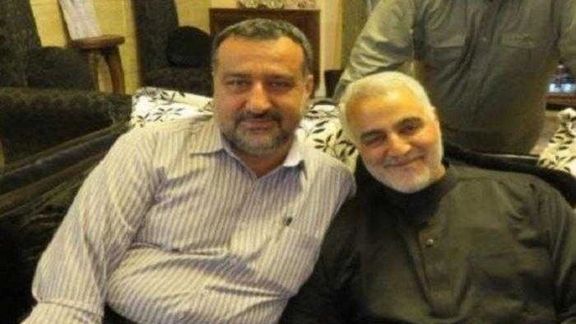
Iranian state media has officially announced the death of Seyed Razi Mousavi, a prominent figure associated with the Iranian Revolutionary Guards in Syria.
The confirmation follows reports from Lebanese media outlet Al-Mayadeen and Reuters, citing unnamed security sources, indicating that Mousavi, a high-ranking IRGC commander, was reportedly killed on Monday in an alleged Israeli airstrike near Damascus. Israel has neither confirmed nor denied the claims.
Explosions were noted in the Set Zaynab area in the Damascus countryside, with social media footage capturing a plume of smoke near the frequently targeted Damascus International Airport—a location often utilized by Iranian proxies in the region.
Unconfirmed reports from Iranian opposition media propose that Mousavi played a crucial role in coordinating financial and logistical support from Tehran to Iranian proxies in Syria.
Considered close to Qassem Soleimani, the former head of the Quds Force killed by a US drone in January 2020, Mousavi's demise is viewed as another significant loss for the IRGC in the region, according to Iranian media sources.
Amidst the ongoing Syrian conflict since 2011, the United Nations estimates that over 300,000 civilians lost their lives in the first decade. The war, persisting for 12 years, has displaced more than half of the country's pre-war population of 22 million, contributing significantly to Europe's migrant crisis.
Syria remains far from stable, influenced heavily by both Moscow and Tehran. The intricate relationship between Russia and Iran faces additional strain as they compete for increased influence in Syria. Iran's presence in the region adds complexity to the ongoing shadow war between Iran and Israel, with a primary focus on Syria.
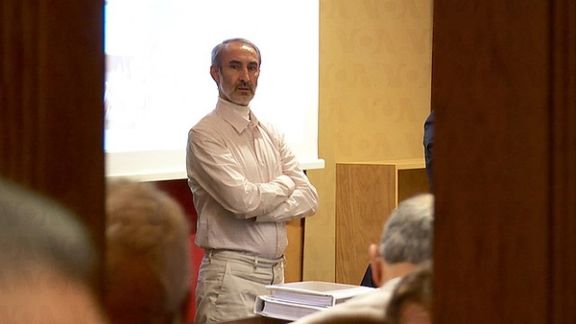
A former jailor found guilty for his involvement in the mass murder of thousands of political prisoners in 1988 is appealing his life sentence.
Hamid Nouri's family is appealing the Swedish court's decision upholding his life sentence to the International Court of Justice in The Hague, according to an Iranian lawmaker.
The Stockholm Court of Appeals upheld Hamid Nouri's life sentence last week following his appeal denying his role in Iran's 1988 massacre. Initially, Nouri was sentenced to life imprisonment by the Stockholm Regional Court on July 14, 2022, equivalent to 25 years in Swedish legal terms.
In an interview with IRNA, Parliamentarian Zohreh Elahian called the sentence which followed 92 trial sessions "premeditated".
In July, Kazem Gharibabadi, the secretary of Iran's High Council for Human Rights, claimed that Sweden was holding Nouri "hostage" and demanded that he be released. He alleged that Sweden had no evidence against Nouri and was simply defending the interests of the opposition in exile, The Mujahedeen-e-Khalq, an exiled Iranian resistance group, who had thousands killed in the massacre.
It is the first time an Iranian regime official has been prosecuted for his role in the 1988 massacre. When the regime was purging political prisoners at Gohardasht Prison in Karaj near Tehran, Nouri was a deputy prosecutor at the prison. In the massacre, approximately 30,000 people were brutally murdered, 90% of whom were members of the People's Mojahedin Organization of Iran (MEK).
In a statement, 452 Iranian activists and victims' families expressed their gratitude for the court's ruling, calling it a "huge victory for the Iranian justice movement."
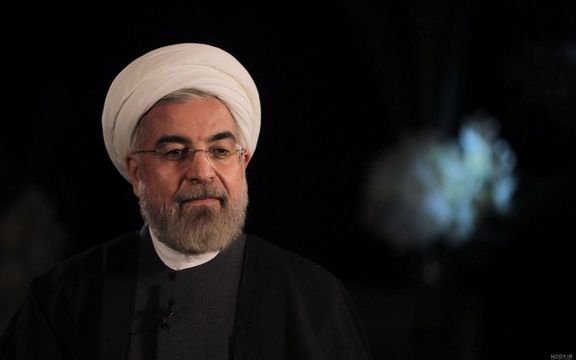
Iran's former president Hassan Rouhani has accused hardliners in power of preferring low-turnout parliamentary elections in March to keep control of the legislature.
“The ruling minority will establish itself better if we don't participate in the elections and minimal elections are held … There is a minority that does not want the majority to go to the ballot box,” Rouhani said in a speech at a meeting with a group of clerics and seminarians on Wednesday.
Rouhani’s website published the text of his speech on Saturday, shortly after Supreme Leader Ali Khamenei in a speech to a large group of hand-picked people from Kerman and Khuzestan provinces stressed the importance of voting in the upcoming elections.
In addition to electing a new parliament, the March 1 vote will also select the eighty-eight clerics of the Assembly of Experts that must choose Khamenei’s successor.
Blaming the opposition for discouraging people from voting, Khamenei insisted that the solution to the country’s problems is voting to form a “strong parliament” and that elections could prevent “dictatorship, chaos, insecurity, and turbulence (anti-government protests)”.
Rouhani registered to run in the elections of the Assembly of Experts at the last moment. He has been a member of the council for three consecutive terms since 1999. The last time that he was elected to the council was during his second presidential term in 2016 when he ran on a slate headed by the moderate former President Akbar Hashemi-Rafsanjani.
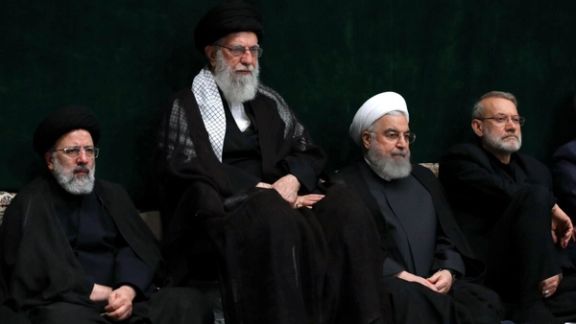
President Ebrahim Raisi joined the council eight later than Rouhani, in 2007.
Agahi-ye No, a reformist bi-monthly, has claimed that several influential figures including the reformist former vice president, Esh’aq Jahangiri, former moderate conservative speaker of the parliament Ali Larijani, and moderate conservative former speaker Ali-Akbar Nateq-Nouri advised Rouhani to run again.
Last week, the Secretary General of the pro-Rouhani Moderation and Development Party, Mohammad-Bagher Nobakht, who also served as the Rouhani administration’s spokesman, said Rouhani is trying to put together a list of sixteen candidates for the Council seats from Tehran but has no intention of doing the same for the parliamentary elections.
Rouhani's website featured a headline that emphasized a sentence from his speech: "Sometimes not voting in elections is a kind of vote." This statement has been perceived by some of his opponents as an encouragement to abstain from voting.
In an editorial on Sunday, the ultra-hardliner Bultan News attacked Rouhani for “proposal not to participate in the elections, on the same day that the Leader of the Revolution stresses participation.”
However, in his speech the former president argued that by not voting, people may be indirectly expressing their opinion about candidates who are not considered competent. In the absence of suitable candidates, it is hard to encourage people to go the ballot boxes, he stated.
“We should try to encourage people to participate and take [appropriate] measures so that those who come to the polls can vote for at least a few people instead of casting blank ballots,” he said referring to the unprecedented blank and void votes that made up at least 10 percent of the vote in the 2021 presidential elections.
Convinced that hardliners committed to Khamenei’s policies will cruise to victory with the help of the Guardian Council, which has barred most other insiders, many Iranians are showing very little interest in the upcoming elections.
A poll recently conducted by the semi-official Iranian Students Polling Agency (ISPA), found 27.9 percent of those polled saying they would definitely vote against 36 percent who said they would not under any circumstances. 21.9 percent said they had made no decision yet.
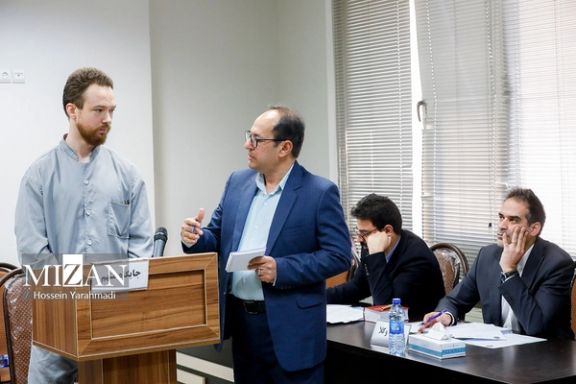
Iran's hardline newspaper Kayhan, has warned that Johan Floderus, a Swedish man currently held in Iran, would receive "significant and regrettable convictions".
The publication, recognized as the official mouthpiece for the leader of the Islamic Republic of Iran, likened the cases of Floderus and Hamid Nouri, a former Iranian prison official held in Sweden for his role in the 1988 massacre of political prisoners.
Floderus, like most foreign prisoners, has been accused among other crimes of "collaboration with Israel". He is one of an unknown number of foreign nationals or dual-nationals held in Iran under its policy of hostage diplomacy.
Currently facing charges of "corruption on earth," a serious Sharia accusation that could lead to a death sentence, Floderus is ensnared in a case that mirrors the lack of transparency characterizing numerous detentions of foreigners in Iran.
Detained in April 2022 on espionage charges during a visit to Iran, Floderus is navigating a legal process marked by limited transparency, raising concerns about a potential hostage situation. His detention has now surpassed 600 days.
Last week witnessed a Swedish court upheld the conviction of Nouri in a first of its kind. It is the first time a member of government has publicly been brought to justice for the tragedy which saw the murder of thousands.